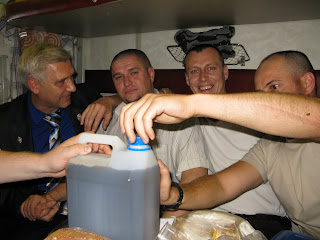Russia has a lot to lose from climate change. A recent study by the
World bank reported that the country is
particularly vulnerable to the effects of climate change due to its ageing infrastructure, environmental damage caused by the Soviet regime and extreme weather patterns. In the 50 years the largest territory in the world can look forward to severe storms, heat waves and flooding, which they are ill-prepared to cope with.
Herders in the north of the country are increasingly under threat from the melting permafrost.
 St Basil's Cathedral, Moscow
St Basil's Cathedral, MoscowRussians refer to an out of place building as a rotten tooth. With the USA and China both now taking climate change more seriously will Russia end up being the
'rotten tooth' in climate negotiations? This is looking less likely than it once was. Russia at last seems to have
stepped up to take its important role in the grand political narrative of climate change.
 Crumbling church gate, North West of Moscow
Crumbling church gate, North West of MoscowAnd when Russia does decide to take action on climate change mitigation, its socialist structures still in place will make it their achievement easier. For example
energy efficiency in buildings will be easier to enforce because freehold of buildings by local government is far more common. In the UK the government has trouble persuading people to install measures like
cavity wall insulation, even when it makes financial sense to do so.
So what do real people think about climate change in Russia? The ones I spoke to are by no means a representative sample but their views do provide an interesting insight into how Russians relate to climate change.
 Traditional Russian wooden house
Traditional Russian wooden house
With varying degrees of seriousness, everyone jokes that the weather will be more amenable because of climate change. I'm no There is unanimity that the weather has changed in recent years, with much milder winters than they are used to.
There is a feeling that other countries have much to lose from climate change but I'm not sure the connection to increaed natural disasters and global food supply, and the potentially disastrous implications for Russia as a
net food importer, have really been made. At least not in the eyes of individuals yet. Many of the people I spoke to believe that it will take a natural disaster, like Hurricane Katrina in the USA, for Russians to take climate change seriously.
Much fuss is made over how readily Russians have embraced consumerism and how bad this is for climate change, amongst other environmental problems. A few days after my first interview with the
six young people from Moscow, I speak again to the most skeptical member of the group, whose first baby is due next spring. He tells me that although some people want only for their children to be rich, he would rather his grew up to be happy. An unusual individual decision or a sign of things to come?
I was particularly struck by the words of
Masha from Irkutsk, when she told about the Russian word ABOCb, pronounced avoss, which is roughly equivalent to saying “what the hell, I know something bad might happen but I'm just hoping it will be ok anyway” that is found in their folklore and fairy tales. I wonder just how important the stories we're taught as children are to the lifelong relationship we have with our environment.
 Emma with the carriage boss on the Trans-Siberian
Emma with the carriage boss on the Trans-Siberian
The Russia I found was a country of extremes and contradictions. There is a clear deep love of the natural world embedded in the Russian psyche, yet the countryside is liberally strewn with broken vodka bottles. The people I spoke to, although concerned themselves about environmental issues, held little hope for their fellow Russians. Despite the pessimistic attitude for which they are justifiably famous, there is also a sense of possibility, that things can change quickly, in this vast country with an ideological scale to match.
56% of Russians think there government should take stronger action on climate change. Russia seems, at last, to be
waking up fast to the realities of climate change and their strong leaders, for better or worse, can implement change at a lightning pace.






























